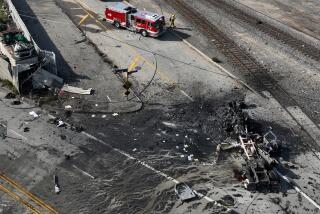Thieves drilling for gasoline -- into autos’ tanks
- Share via
DETROIT — Dale Fortin is getting a new kind of customer at his Detroit auto repair shop, customers who have not just been in a fender-bender or had a windshield smashed by a rock.
The soaring price of crude oil has turned gasoline tanks into a cache of valuable booty, and Fortin has replaced several tanks punctured or drilled by thieves thirsting for the nearly $4-a-gallon fuel inside.
“That’s the new fad,” he said. “I’d never seen it before gas got up this high.”
Although gas station drive-offs and siphoning are far more common methods of stealing the fuel, reports of tank and line puncturing are starting to trickle in to police departments and repair shops across the country.
Some veteran mechanics and law enforcement officers say it’s an unwelcome return of a crime they first saw during the Middle East oil embargo of the early 1970s.
Given their height, pickup trucks and sport utility vehicles are more vulnerable to the thieves who puncture the tanks and use a container to catch the fuel, Fortin said.
Plastic tanks are typically the target, he said, because there is less chance of sparking a fire and they are easier to drill into.
A design change may also be contributing to the preference for a drill rather than a siphoning hose. The tanks in many vehicles now have “check balls,” which prevent spills in a rollover accident. They also make siphoning more difficult.
In recent weeks, police in Denver arrested two suspects in connection with about a dozen cases of damaged tanks and stolen gas.
Denver Police Det. John White sees this “new way of siphoning gas” as a bigger problem.
“What made this particular method so dangerous and concerning for us was the way in which they were doing it -- using cordless drills to puncture holes in these tanks,” he said of the rash of cases his department had investigated this spring. “The heat, friction generated could have easily sparked a fire. It just made for a dangerous situation for the suspects and the community.”
Tank puncturing has yet to reach the radar screens of law enforcement groups such as the National Sheriffs’ Assn. or the Automotive Service Assn., a group that represents independent garage operators.
Still, at least one insurance company has taken notice: AAA Mid-Atlantic issued a news release this month citing a case in April in Bethesda, Md., involving a thief who broke the fuel line underneath a car and drained five gallons of gas. Montgomery County police said a bus in the same parking lot had 30 gallons of diesel stolen.
“These are crimes of opportunity,” AAA spokeswoman Catherine Rossi said. “Right now, some people think that stealing gas is a way to get rich quick. It becomes a question of whether you’re leaving yourself open to the possibility that someone can get to your car without being seen.”
The cost of replacing a metal tank on passenger vehicles is $300 to $400, and the plastic tank common on newer vehicles would be at least $500.
Bruce Burnham said thieves have hit the Budget Truck Rental business he owns in Shreveport, La., about half a dozen times in the last three years. The thefts started shortly after Hurricane Katrina when prices spiked, stopped for a while, then restarted about a year ago.
In some cases the gas lines had been cut; in others, gas had been pumped out. He figures he’s lost at least a few thousand dollars in stolen fuel, repair costs and loss of rental fees.
Burnham said he had taken “extra measures to protect the vehicles” but declined to elaborate.
Troy Police Lt. Gerry Scherlinck said his department in suburban Detroit this month received a report of a stored motor home whose tank was siphoned and drained of 50 gallons of gas. There were also several reported incidents last year in industrial parks where the gas tanks of vehicles were punctured, he said.
“Gas is liquid gold these days, and has been for the last year and a half,” Scherlinck said. “I would anticipate seeing more of these kinds of incidents as the price continues to go up.”






